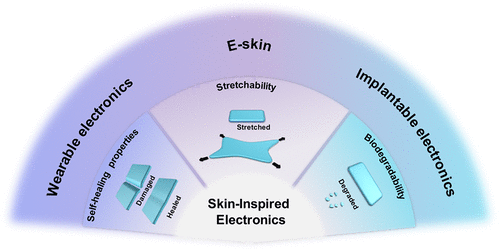当前位置:
X-MOL 学术
›
Acc. Chem. Res.
›
论文详情
Our official English website, www.x-mol.net, welcomes your
feedback! (Note: you will need to create a separate account there.)
Skin-Inspired Electronics: An Emerging Paradigm
Accounts of Chemical Research ( IF 16.4 ) Pub Date : 2018-04-25 00:00:00 , DOI: 10.1021/acs.accounts.8b00015 Sihong Wang 1 , Jin Young Oh 1, 2 , Jie Xu 1 , Helen Tran 1 , Zhenan Bao 1
Accounts of Chemical Research ( IF 16.4 ) Pub Date : 2018-04-25 00:00:00 , DOI: 10.1021/acs.accounts.8b00015 Sihong Wang 1 , Jin Young Oh 1, 2 , Jie Xu 1 , Helen Tran 1 , Zhenan Bao 1
Affiliation

|
Future electronics will take on more important roles in people’s lives. They need to allow more intimate contact with human beings to enable advanced health monitoring, disease detection, medical therapies, and human–machine interfacing. However, current electronics are rigid, nondegradable and cannot self-repair, while the human body is soft, dynamic, stretchable, biodegradable, and self-healing. Therefore, it is critical to develop a new class of electronic materials that incorporate skinlike properties, including stretchability for conformable integration, minimal discomfort and suppressed invasive reactions; self-healing for long-term durability under harsh mechanical conditions; and biodegradability for reducing environmental impact and obviating the need for secondary device removal for medical implants. These demands have fueled the development of a new generation of electronic materials, primarily composed of polymers and polymer composites with both high electrical performance and skinlike properties, and consequently led to a new paradigm of electronics, termed “skin-inspired electronics”.
中文翻译:

灵感来自皮肤的电子产品:新兴范式
未来的电子产品将在人们的生活中扮演更重要的角色。他们需要允许与人类之间更加亲密的接触,以实现高级的健康监控,疾病检测,药物治疗以及人机界面。然而,当前的电子设备是刚性的,不可降解的并且不能自我修复,而人体是柔软的,动态的,可拉伸的,可生物降解的并且可以自我修复。因此,至关重要的是开发一种具有皮肤样特性的新型电子材料,其中包括具有可伸缩性的贴合性,最小的不适感和抑制的侵入性反应。自愈,在恶劣的机械条件下具有长期的耐用性;以及可生物降解性,以减少对环境的影响并消除医疗植入物的二次设备移除需求。
更新日期:2018-04-25
中文翻译:

灵感来自皮肤的电子产品:新兴范式
未来的电子产品将在人们的生活中扮演更重要的角色。他们需要允许与人类之间更加亲密的接触,以实现高级的健康监控,疾病检测,药物治疗以及人机界面。然而,当前的电子设备是刚性的,不可降解的并且不能自我修复,而人体是柔软的,动态的,可拉伸的,可生物降解的并且可以自我修复。因此,至关重要的是开发一种具有皮肤样特性的新型电子材料,其中包括具有可伸缩性的贴合性,最小的不适感和抑制的侵入性反应。自愈,在恶劣的机械条件下具有长期的耐用性;以及可生物降解性,以减少对环境的影响并消除医疗植入物的二次设备移除需求。











































 京公网安备 11010802027423号
京公网安备 11010802027423号